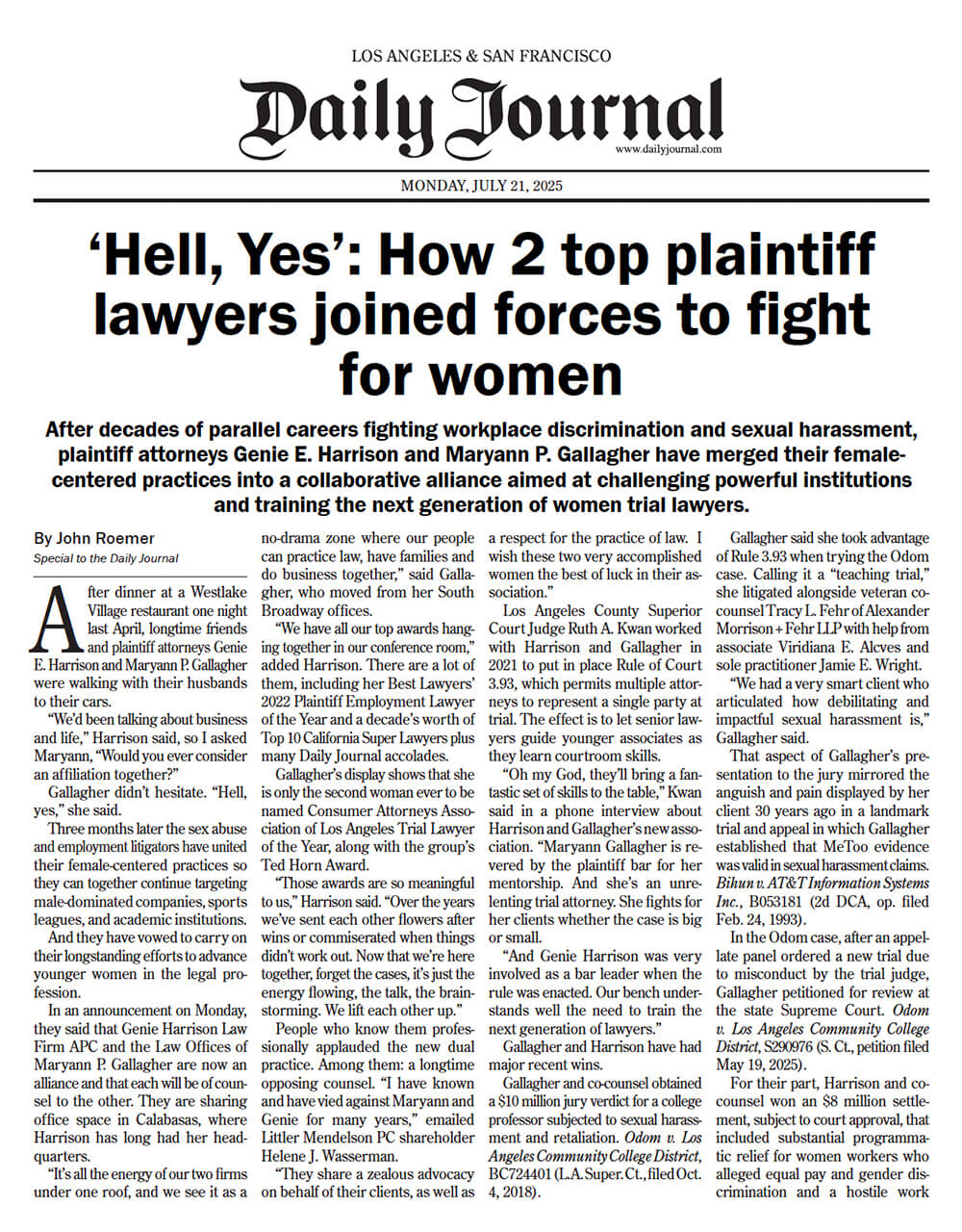Alas, Women – Barrett Is No Ginsburg
11/3/2020 — by Genie Harrison for Ms. Magazine
(Read the story below, or here at MsMagazine.com)
Justice Ruth Bader Ginsburg’s lifelong work to achieve equality was unrelenting while serving on the Supreme Court. On the other hand, Amy Coney Barrett’s appointment to the Supreme Court puts freedom of choice, affordable health care, marriage equality and other hard-won rights at risk.
A mere month has passed since the death of Ruth Bader Ginsburg, and the Senate has confirmed another woman, Amy Coney Barrett, to fill her spot on the U.S. Supreme Court. The blatant politics and sheer hypocrisy of this fast-track process in the waning days of a presidential election cycle require no further elaboration.
What is helpful at this moment in our nation’s history is to examine the character and achievements of these two women, to understand what they have meant and what they will mean—for women, for minorities, for the underprivileged and disenfranchised, for workers and for everyone who cares about the future of our country.
Ruth Bader Ginsburg and Amy Coney Barrett share exceptional academic and analytical records. Both graduated at the top of their law school classes and went on to teach law, author papers and achieve recognition as experts in their fields.
But that is where the similarities end. It’s instructive to look at these women at the moment of their ascension to the nation’s highest court.
Ruth Bader Ginsburg
The woman who became known as “the Notorious RBG” married her husband a month after she graduated from her undergraduate studies at Cornell. At the age of 21, she was demoted from her job at the Social Security Administration office in Oklahoma because she became pregnant, and she gave birth to a daughter six months before starting law school at Harvard.
She was one of only nine women students in her class. After graduating first in her class from Columbia Law School, where she transferred when her husband obtained a job in New York, she received no job offers and was rejected for a clerkship with then-Supreme Court Justice Felix Frankfurter because of her gender. Ginsburg finally obtained a clerkship with Judge Edmund L. Palmieri of the U.S. District Court for the Southern District of New York.
Ginsburg turned these setbacks into opportunities. After her clerkship she was hired as a research associate for and then became the associate director of the Columbia Law School Project on International Procedure. Living in Sweden, she learned Swedish and co-authored a book with Swedish jurist Anders Bruzelius, a project that profoundly influenced her thinking on gender equality.
As a professor at Rutgers and Columbia Law Schools, she was one of the few women teaching civil procedure.
In 1970, she co-founded the Women’s Rights Law Reporter, the first U.S. law journal to focus exclusively on women’s rights.
In 1972, she co-founded the ACLU’s Women’s Rights Project, and as its director she argued six gender discrimination cases before the United States Supreme Court.
By 1974, the Women’s Rights Project and other ACLU projects participated in more than 300 gender discrimination cases. Ginsburg was an incredible strategic thinker, attacking gender discrimination by challenging discriminatory statutes and practices, often focusing on the negative impacts on men based on gender bias against women. Ginsburg’s work through the ACLU’s Women’s Rights Project profoundly shaped women’s rights across the country, affecting how states treated women in subsequent legislation.
President Carter appointed Ginsburg to the U.S. Court of Appeals for the District of Columbia Circuit in 1980. During her thirteen years as a judge on the D.C. Circuit, she was known as a moderate, someone who worked to find consensus with her conservative colleagues.
By the time Ginsburg was named by President Clinton to the Supreme Court in 1993, she had been a federal judge for thirteen years. Justice Ginsburg’s lifelong work to achieve that for which the framers of the Constitution provided—equality—was unrelenting while serving as a Supreme Court Justice. She brilliantly authored opinions, striking down the Virginia Military Institute’s male-only admissions policy as violative of the Equal Protection Clause, and she was famous for her dissents, which she sometimes read from the bench to signal her strong disagreement with the majority.
As her friend, the late Justice Antonin Scalia, aptly said, Ginsburg was the Thurgood Marshall of women’s rights.
Amy Coney Barrett
Barrett’s first job of note was clerking for Justice Scalia, after which she worked at a law firm that represented George W. Bush in Bush v. Gore. From 2002 through early 2017, she was a professor at George Washington University Law School and then Notre Dame, her alma mater.
She was nominated to the 7th Circuit by Trump on October 31, 2017. When President Trump nominated her to succeed Ginsburg on the Supreme Court on September 26, 2020, Barrett had served less than three years as a federal judge.
While serving on the Seventh Circuit, Barrett issued decisions that show a decidedly pro-business mindset. When discrimination cases were before her, she sided with employees just eight percent of the time. Last year, Barrett wrote a unanimous opinion in Smith v. Illinois Dept. of Transportation, holding that no hostile work environment was created when supervisors yelled and swore at Smith, a Black employee, or when a former supervisor called him a “stupid ass ni[ ]” because he had filed a complaint with the EEOC.
Barrett’s voting record on the bench is almost uniformly conservative in cases touching on abortion, gun rights and immigration. The Federalist Society hand-picked Barrett.
Given the Republican Senate’s blatant disregard for their own precedent—refusing to appoint Obama’s Supreme Court pick in an election year—it isn’t hard to predict how Barrett will decide cases at the Supreme Court. She’s a 48-year-old beginning a lifetime appointment and will move the court firmly to the right for decades to come.
Barrett has provided a clear road map to future decisions, both through her writings and her personal life. On a woman’s right to choose and gay marriage, she signed a letter in 2015 to the Synod on the Family affirming the Catholic Church’s teaching that “marriage and family [are] founded on the indissoluble commitment of a man and a woman.”
In 2006, she signed an advertisement by St. Joseph County Right to Life, an anti-abortion group, in a South Bend, Indiana newspaper: “We, the following citizens of Michiana, oppose abortion on demand and defend the right to life from fertilization to natural death. Please continue to pray to end abortion.”
An unsigned, second page of the advertisement read, “It’s time to put an end to the barbaric legacy of Roe v. Wade and restore laws that protect the lives of unborn children.”
A 2013 law review article omits Roe v. Wade from the list of cases that Barrett considers “superprecedents.” In her mind, the case is not so well settled that it is immune to reversal or challenge.
On health issues, in a 2017 law review article, she criticized Chief Justice Roberts’s 2012 opinion sustaining the individual mandate, which is a central provision of the Affordable Care Act.
Barrett worked for the Alliance Defending Freedom (ADF), America’s largest anti-LGBTQ legal organization. She taught a class at five sessions of the ADF’s legal fellowship program, which trains Christian lawyers “to foster legal systems that fully protect our God-given rights.”
People of Praise, the Christian community of which Barrett is a member, is anti-abortion and expels members who engage in gay sex. It is said to condone practices that border on authoritarianism, intense groupthink and regressive gender dynamics in which women are subservient to men.
All Is Not Lost
Short of a new administration’s decision to unpack and expand the Supreme Court, the future will be a conservative supermajority on the court. Freedom of choice, affordable health care, marriage equality and other hard-won rights are at risk.
But all is not lost. Barrett, a textual originalist, says the law is the law. A new, progressive (i.e., Democratic) Congress could enact legislation that makes abortion, gay marriage, universal health care and other sacred rights permanent fixtures of our national structure.
For this reason—and a million others—you must get out and VOTE.





